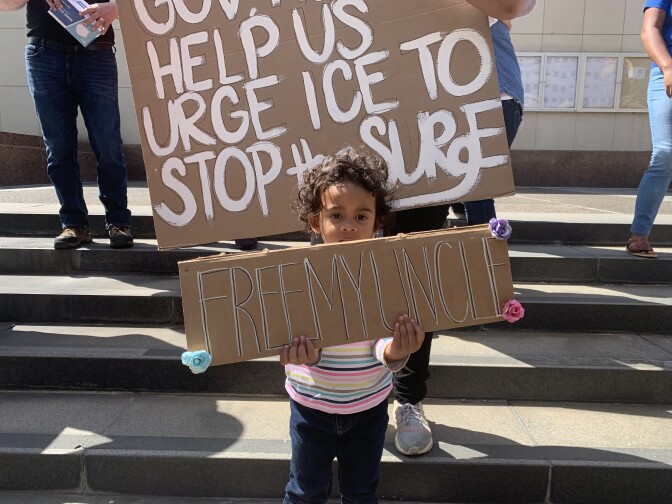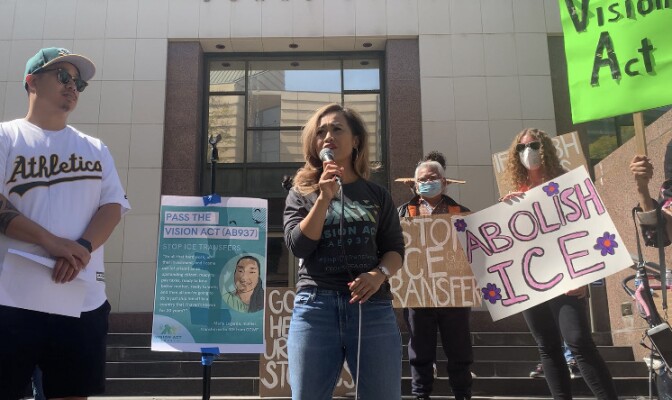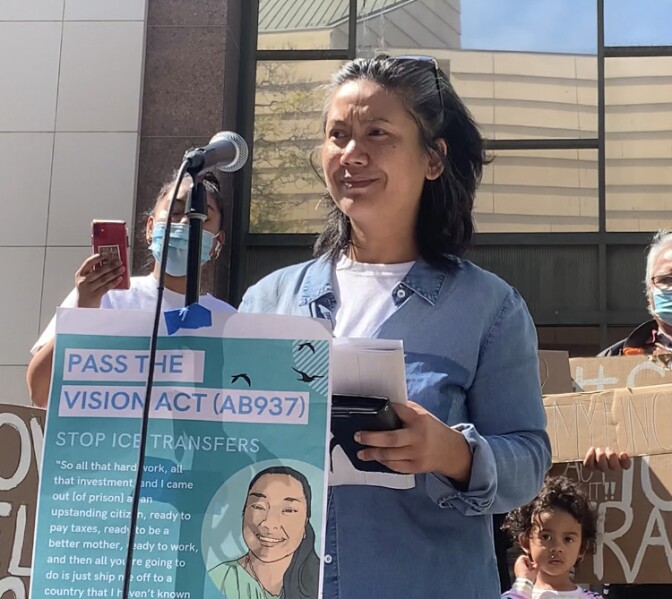This story is free to read because readers choose to support LAist. If you find value in independent local reporting, make a donation to power our newsroom today.
Surprise Relief For Quadriplegic Man At Center Of Fight To Stop Prison-To-ICE Transfers

Supporters of Vithea Yung have long feared he’d become one of hundreds of non-citizens in state prison who are transferred every year to federal immigration authorities, setting them on a path to deportation.
Immigration rights activists are seeking clemency for the Cambodian-born Yung, whose family came as refugees when he was a child and settled in Long Beach. They argued that Yung is anything but a threat to public safety — not just because of a prison accident that left him paralyzed from the neck down, but also because of steps he’s taken to change his life since being tried and convicted as an adult of a gang-related murder at 16.
In recent months, Yung, now 43, has become one of the faces of the VISION Act, a bill before the state legislature that would bar California’s prison system from handing over most immigrants to ICE upon their release.
But now it’s apparent that U.S. Immigration and Customs Enforcement has bigger concerns than deporting Yung. Last November, it dropped its request that the state keep an ‘immigration hold” on him.
It would be months later, however, before Yung learned of the development.
On Friday, a federal spokesperson responded to an LAist inquiry about Yung’s case with an email saying the agency had lifted an immigration detainer on Yung, “as it was determined upon further review that this case did not meet civil immigration enforcement priorities.”
Contacted Friday about the ICE decision, Yung’s attorney, Anoop Prasad of the Asian Law Caucus, said that was the first they had heard of it and were hugely relieved.
But, “while we celebrate this rare community victory,” Prasad said, “California cannot rely on ICE — an agency with a track record of cruelty and abuse — to act with basic decency when it comes to the well-being of its residents.”
It was a rare instance of ICE publicly acknowledging that it had changed the status of a person in prison, said Ny Nourn, co-director of the Asian Prisoner Support Committee. She said it is hard to understand how the agency operates because it usually reveals very little to the incarcerated or their families.
Had ICE told Yung’s family about its decision earlier, “additional hardships or anxiety could have been prevented,” Nourn said. “There’s no rhyme or reason. How ICE operates is very inconsistent.”
She said in 2020 no explanation was given when another Cambodian-born man, Chanthon Bun, was released from state prison under the belief he would be transferred to ICE custody, but he was not picked up.
Not knowing about the ICE decision, Yung’s family and activists have been advocating vigorously for him to be allowed to stay in the U.S. after his release from prison through an online campaign. Last Friday, dozens attended a rally calling for his release in downtown Los Angeles.

Supporters felt like they had been in a race against time ever since Nov. 12, when the California parole board approved Yung’s release after more than 25 years of incarceration. Six days later, according to ICE, its detainer request for Yung was removed.
It is now up to Gov. Gavin Newsom to decide whether to allow parole. Newsom has 150 days from the issuance of the parole board’s recommendation, making April 11 the deadline. The governor’s office says it does not comment on individual parole cases.
Because granting parole does not protect a formerly incarcerated person from deportation, Yung’s supporters had also asked Newsom to block his transfer to ICE. But ICE’s announcement that Yung’s case is not a priority dramatically allays fears that he will be deported — though not completely.
“I don't trust ICE, right?” Nourn said. “However, I want to give them the benefit of the doubt.”

Nourn was among the speakers at Friday’s rally attended by dozens of Latino and Southeast Asian activists, whose communities are most affected by the prison-to-ICE transfers.
Yung’s sister, Terry Honore, spoke of her brother’s efforts to improve his life since he was convicted of murder as an adult for the fatal shooting of the member of another gang. In the decades since, he’d been studying and mentoring before a 2017 fall during a softball game resulted in a spinal cord injury that has left him unable to feed or bathe himself.
“He needs us to help him live life with dignity,” Honore said at the rally, where her two-and-a-half year-old daughter carried a sign that read “Free My Uncle.”
Honore said she would have wanted to know earlier that ICE had lifted the immigration hold on her brother, but she was also happy to have worked with activists to highlight the need for the VISION Act, so that families such as hers don’t have to worry about losing loved ones to countries many of them barely know.

Nourn said a positive outcome of the late notification about ICE dropping the detainer is that Yung and his family were able to reach out to activists earlier this year and develop into passionate advocates of the VISION Act.
She recalled Yung saying during a group call that he was hopeful that whatever the outcome of his case, "my story will help other people to hear the injustice of what's happening."
As for Yung, he now awaits word about his future from the governor’s office from a hospital bed in Sylmar, where he’s being held in a skilled nursing facility under contract with the state prison system.








